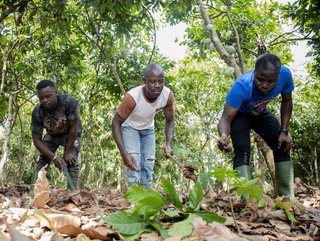Nestlé's Net-Zero Commitment Hinges on Sustainable Sourcing

Nestlé is on a determined mission to cut carbon emissions, with a commitment to reach net zero by 2050.
More immediately, by 2025 the world's largest food and beverage company wants to reduce its absolute greenhouse gas (GHG) emissions by 20% versus a 2018 baseline figure, and by 50% by 2030.
One recent measure of Nestlé's progress can be seen in its sustainability data for 2023, where a 13.58% net reduction in emissions was achieved.
A significant proportion of the multinational organisation's efforts in this space are underpinned by responsible sourcing, which translates, in this case, as considering farming practices and their impacts on forests and natural ecosystems.
It also takes into account the extent to which human rights and animal welfare practices are respected by growers and suppliers.
Among Nestlé's headline goals is for 100% of its key ingredients volumes to be responsibly sourced by 2030.
Focused on responsible sourcing
Evidence of Nestlé's commitment to sustainable sourcing can be seen in projects launched alongside two of its suppliers, Cargill and ETG | Beyond Beans, using agroforestry to regenerate land around cocoa farms.
These five-year programmes are set to accelerate the transition to regenerative agriculture and support reforestation of degraded lands around cocoa-farming communities. A range of shade tree species will be distributed to farmers, who will be taught tree planting and pruning techniques.
Shade trees are used to help reduce the harsh effects of the sun and provide moisture-rich spaces for cocoa crops to survive during the dry season. They can also improve water management and absorb carbon from the atmosphere.
"These projects are important milestones on our journey to net zero," explains Darrell High, Global Cocoa Manager at Nestlé. "We're working to address our emissions all the way to the farms we source from."
By partnering with Cargill and ETG | Beyond Beans, it's hoped more than two million shade tress will be planted on land managed by almost 20,000 farmers in Ghana and Côte d'Ivoire. Together, it's estimated they will reduce and remove more than 500,000 tonnes of carbon over a 20-year period.
A key success factor of the initiatives will be the survival rate of the trees, with farmers receiving an incentive payment when they plant the tree seedlings and care for them.
******
Check out the latest edition of Procurement Magazine and sign up to our global conference series – Procurement & Supply Chain LIVE 2024.
******
Procurement Magazine is a BizClik brand.
- What is The White House's Sustainable Procurement Programme?Sustainability
- How is Clarins Group Boosting Supply Chain Sustainability?Sustainable Sourcing
- Ericsson: Driving Sustainability Together With T-MobileSustainability
- Ericsson: Driving Sustainability Together With T-MobileSustainability






